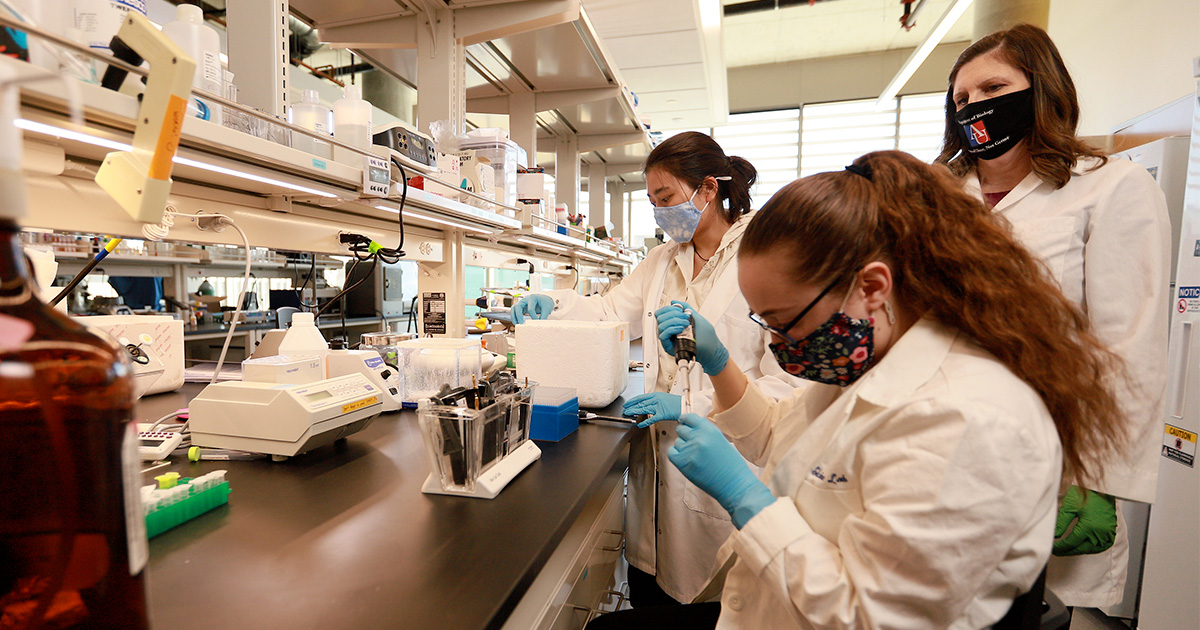From Cancer Researcher to Health Ambassador and Classes In Between

Senior biology major Farah Hussaini tried to experience everything STEM from the moment she stepped onto AU’s campus.
The future doctor balanced classes in biology, premed, public health, and applied physics with study abroad at King’s College London’s health and society program and cancer research with College of Arts and Science professor Katie DeCicco-Skinner. She served as a peer tutor in the AU Biology Lab, student editor for CAS’s science magazine, Catalyst, a health and safety ambassador during the COVID-19 pandemic, a member of premed fraternity Phi Delta Epsilon, and philanthropy chair for her sorority, Delta Gamma, raising funds for the nonprofit Service for Sight.
Hussaini said her relationship with biology department chair DeCicco-Skinner, whom Hussaini called “one of my greatest mentors in college,” began early when she introduced herself and asked questions about her biology major including the rigorousness of its academics, if biology students can study abroad, and available research opportunities.
“Forming connections with professors is really important because they all have helpful advice and guidance to offer. It was also great having a mentor, especially a female mentor, while pursuing a male-dominated field like the sciences,” Hussaini said.
Her two-year stint in DeCicco-Skinner’s lab began in the second semester of her first year after taking DeCicco-Skinner’s cell biology class. In the Hall of Science’s state-of-the-art lab, Hussaini worked with DeCicco-Skinner on two projects as they examined tumor progression and its role as novel tumor suppressor in cutaneous squamous cell carcinoma as well as the relationship between antibiotic resistance and obesity on the growth and proliferation of multiple myeloma cells.
Hussaini said working in DeCicco-Skinner’s lab “taught me so much about collaboration, critical thinking, and problem solving. I had the opportunity to apply scientific concepts that I learned in class and really make them come to life. And, of course, it’s an honor to contribute to the global efforts to understand the mechanisms of cancer.”
Like her research with DeCicco-Skinner, Hussaini has tried to apply her strong interest in the sciences in different contexts throughout her time at AU, curating her schedule so she could “teach, lead, write, and research.” She said all of her activities yielded a new skill set, and her love for the sciences tied it all together.
At Catalyst, she honed her scientific writing skills while learning about a range of topics, from microplastic research to the urban heat island effect. As an AU Biology Lab tutor, she tested her scientific knowledge while gaining strong leadership, active listening, and communication skills.
Finally, as a health and safety ambassador and sorority philanthropy chair, she applied her love for the sciences to real-world scenarios. “These experiences tackled bigger questions for me—how do I raise awareness about common visual impairment and disease prevention among the public? How can I contribute to ending the pandemic? How can I take the skills I learned inside the classroom and apply those to situations outside the academic walls?” she .
As for incoming students, Hussaini said getting involved in research early, meeting professors, and joining STEM-related clubs are important ways incoming students can immerse themselves in STEM at AU. The university offers STEM student resources on its website, including clubs, community service opportunities, scholarships, and fellowships.
“By applying your STEM interests outside the classroom, you’ll gain valuable skills and make great friends along the way,” Hussaini said.
